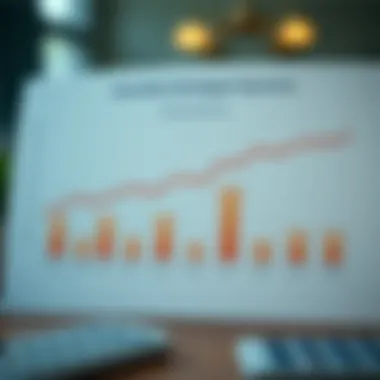Understanding Monthly Payments on a $250K Mortgage


Intro
Navigating the waters of home financing can often feel like you are trying to make sense of a kaleidoscope. Specifically, when it comes to a $250,000 mortgage, understanding the nitty-gritty details — especially monthly payments — becomes paramount. These payments can make or break the bank for young professionals, families, or students trying to find a place they can call home without breaking the budget. Assuming you’ve thought about getting a mortgage, knowing the monthly payments and the factors influencing them is vital for making informed financial decisions.
In this article, we’ll dive into the critical pieces of the puzzle: from what a mortgage actually entails to unraveling how interest rates, terms, and even your credit score can shift those monthly payments.
Overview of Financial Product
Definition
A mortgage is essentially a loan specifically for purchasing real estate. Unlike a personal loan, where you can use the funds for just about anything, a mortgage is secured against the property itself. If you fail to repay the loan, the lender has the right to take possession of your home.
Key Features
- Secured Loan: A mortgage is backed by the property, providing the lender with a safety net.
- Long-Term Financing: Mortgages typically span 15 to 30 years, allowing for manageable payments over time.
- Interest Rates: These rates can be fixed or adjustable, affecting your total cost and monthly payments.
Purpose and Benefits
The primary purpose of a mortgage is to facilitate homeownership. Given property prices, few can afford to pay cash upfront. A mortgage breaks down the purchase into manageable bites. Some benefits include:
- Building Equity: Each payment contributes to your ownership stake in the home.
- Tax Deductions: Mortgage interest can be deductible on your taxes, providing potential relief.
Types and Categories
Mortgage Types
When considering a mortgage, it’s important to understand that not all mortgages are created equal. Here are some common types:
- Fixed-Rate Mortgages: The interest rate remains constant throughout the loan term. Ideal for those who prefer stability.
- Adjustable-Rate Mortgages (ARMs): Rates can fluctuate based on market conditions, potentially lowering initial costs but introducing uncertainty over time.
- FHA Loans: Backed by the Federal Housing Administration, these are designed for low-to-moderate income borrowers and often require lower down payments.
Pros and Cons
Each mortgage type comes with distinct advantages and drawbacks. For instance, fixed-rate loans typically give peace of mind but may carry a slightly higher interest rate compared to introductory rates on ARMs.
Situational Uses
Choosing the right mortgage often depends on your unique situation. For first-time homebuyers, an FHA loan might be a great fit due to lower down payment requirements. The flip side is, the traditional 30-year fixed-rate mortgage benefits those who value predictability in their monthly budget.
Application Process
Steps to Apply
- Assess Your Financial Situation: Understand your credit score and debt-to-income ratio.
- Gather Documentation: Collect proof of income, tax returns, and details on existing debts.
- Shop Around: Compare loan offers from different lenders to find the best rate.
- Complete Application: Fill out the necessary paperwork, ensuring all information is accurate.
- Get Pre-Approved: This provides a clearer idea of how much you can afford and makes you a more attractive buyer.
Eligibility Requirements
Different lenders have varied eligibility standards, but generally, you’ll need:
- Adequate credit score (often 620 or above for conventional loans, though FHA loans may accept lower)
- Stable employment history.
- Sufficient income to cover monthly payments, typically tested through a debt-to-income ratio
Documentation Needed
Here’s a quick rundown of common paperwork required:
- Tax returns for the past two years
- Recent pay stubs
- Bank statements
Common Mistakes to Avoid
- Neglecting to check your credit before applying can lead to unexpected surprises.
- Failing to read the fine print on loan terms might leave you with hidden fees.
Tips for Success
- Stick to your budget — don't be tempted to stretch for a more expensive property.
- Consider the long-term impacts of interest rates on your overall payment.
Costs and Fees
Types of Fees Associated
Not all costs come from your monthly payments; there are various fees associated with a mortgage:
- Origination Fees: Charged by the lender for processing the loan.
- Appraisal Fees: Ensure the property is valued correctly before purchase.
- Title Insurance: Protects against defects in the title.


Interest Rates and APR for Loans
Interest rates can heavily influence your monthly payment amounts. A lower rate can mean saving thousands over the life of the loan. Here’s how to keep an eye out:
- Fixed Rates: Ideal for budgeting, but often higher at the outset.
- Variable Rates: While they may start lower, they can climb and lead to increased payments.
Closing Costs for Mortgages
Closing costs can range from 2% to 5% of the loan amount. Factor these into your overall budget when considering a mortgage.
Comparisons of Costs Across Options
Before settling on a mortgage, weigh the long-term costs:
- Use calculators found at websites like Bankrate to simulate various scenarios on mortgage choices.
- Don’t shy away from negotiating fees with your lender. They want to earn your business.
Preface to Mortgages
When it comes to buying a home, understanding mortgages is not just important; it's a necessity. A mortgage serves as the backbone of real estate financing, allowing individuals and families to invest in property even without having the full amount available upfront. By breaking down the home cost into manageable payments, mortgaging opens the door to homeownership for many that might have thought the dream was just out of reach.
A mortgage isn't just a loan; it's a financial contract that provides both security and accountability. It’s crucial to grasp how these loans work, as they can significantly affect one’s finances over the duration of the repayment period. From interest rates to loan terms, comprehending the nuances can help buyers make informed choices. This article aims to demystify all that comes with a 250k mortgage, offering insights that will be beneficial for young professionals, families, or students considering their first home.
Each aspect of a mortgage, including calculation methods and various types, will be tackled in detail. What’s also vital to understand is how market fluctuations, personal credit scores, and specific loan conditions can impact monthly payments. By weaving these factors together, potential buyers can appreciate the bigger picture and make educated financial decisions going forward.
In the following sections, we will address key elements of mortgages, from their definition to types, making it clear why knowing these details plays a vital role in shaping one’s home financing path.
What is a Mortgage?
A mortgage can be simply defined as a form of loan specifically for purchasing real estate. The funds borrowed are used to pay for the property, and in return, the property itself serves as collateral. This means if the borrower defaults on the loan, the lender can take hold of the property through a legal process known as foreclosure. It's clear that a mortgage is far more than just a piece of paper; it’s a legal commitment involving property ownership.
The parties involved in a mortgage include the borrower (the home buyer) and the lender (usually a bank or credit union). The loan typically includes terms regarding the loan amount, interest rate, repayment schedule, and any requirements for property insurance or taxes. Understanding this basic definition helps one appreciate the implications of mortgage agreements, as they bind both parties to the stated terms.
Types of Mortgages
When diving into mortgages, one will find that there are a variety of types available, each offering different terms and conditions suitable for different needs. Here, the focus will be on two primary types: fixed-rate and adjustable-rate mortgages.
Fixed-rate Mortgages
Fixed-rate mortgages are a tried-and-true option for many homebuyers. The key characteristic of this type is that the interest rate remains constant over the life of the loan. This stability offers predictability, which is often comforting for individuals trying to budget their finances.
One major advantage of a fixed-rate mortgage is that as the economy shifts and interest rates fluctuate, the homeowner's monthly payment stays the same. This can be quite advantageous in a rising interest rate environment, where homeowners are sheltered from abrupt increases. It is a popular choice because it allows families to plan their finances without worrying about the unpredictability of monthly payments.
However, this structured repayment can present a disadvantage too. Generally, fixed-rate mortgages come with a slightly higher initial rate compared to adjustable-rate mortgages. Thus, for someone who might plan to move in a few years, paying more initially could feel unnecessary.
Adjustable-rate Mortgages
On the flip side lie adjustable-rate mortgages, often referred to as ARMs. The unique feature of ARMs is that their interest rates are not fixed but fluctuate based on market indices. This means initially, homeowners might benefit from lower rates compared to fixed options, hence making it an attractive option for those wanting to save upfront.
One of the significant advantages of ARMs is their potential for lower initial payments. In a market where rates are stable or decreasing, this can be quite beneficial. However, the disadvantage is the uncertainty lurking ahead; as rates rise, so do the homeowners’ monthly payments, which can lead to budgeting headaches. Thus, understanding one’s risk tolerance is crucial when considering this type of mortgage.
These variances in mortgage types highlight the importance of selecting one that aligns with personal financial situations and goals. In doing so, homebuyers can position themselves toward a sound investment for the future.
The Basics of a 250k Mortgage
When discussing the intricacies of a mortgage, it’s essential to lay down a solid foundation about what a 250k mortgage entails. By understanding the basic components, potential homeowners can make better financial decisions and navigate the complexities that often accompany home financing.
Understanding the Loan Amount
The loan amount, in this case, $250,000, isn't just a mere number. It represents a significant commitment that will impact a borrower's financial landscape for years to come. This amount can determine monthly payments, interest obligations, and even the feasibility of affording additional costs such as property taxes and homeowner’s insurance.
To put things into perspective, if one were to finance a home worth $250,000, the specifics of the mortgage, including down payment requirements, interest rates, and loan terms, are crucial to understand. For instance, a higher down payment can reduce the loan amount and consequently lessen monthly liabilities. On the contrary, a minimal down payment will keep the loan amount higher, which can lead to increased monthly payments. This is especially pivotal for first-time homebuyers who may not have substantial savings set aside for a down payment.
Purpose of a 250k Mortgage
The purpose of obtaining a 250k mortgage extends beyond merely securing a loan to buy a home. It represents a stepping stone toward financial stability and investment in one’s future. With homeownership often seen as a cornerstone of the American Dream, understanding why individuals pursue this particular mortgage amount becomes crucial.
Often, prospective buyers look at a mortgage of this size because it aligns with their goals, whether it’s to buy a starter home for a growing family or perhaps to invest in rental property. The 250k figure might be a sweet spot in many metropolitan areas, allowing buyers to access neighborhoods that offer both livability and potential for appreciation in property value. Furthermore, understanding the purpose also encompasses recognizing the responsibility that comes with it—like maintaining the home and making timely payments.
A mortgage can serve as not just a means to an end but as a powerful financial tool for building equity and securing a solid foothold in real estate.
In summary, grasping the basics of a 250k mortgage offers invaluable insights into home buying. The specifics of the loan amount and an appreciation of the overarching purpose of financing a home can guide prospective buyers towards making informed decisions, ensuring their investment aligns with their long-term financial aspirations and goals.
Monthly Payment Breakdown


Understanding the monthly payment breakdown is crucial for anyone navigating the waters of a $250,000 mortgage. It’s like putting together pieces of a puzzle; you need each piece to see the full picture of your financial commitment. This breakdown sheds light on how your overall monthly obligations shape up, and enables you to make informed choices about your mortgage. By grasping what factors contribute to your payment, you can better prepare for long-term financial stability.
Calculating Monthly Payments
Calculating your monthly payments might sound like a daunting task, but with the right information at hand, it can become quite straightforward. The formula most commonly used to determine your monthly mortgage payment is:
[ M = P \fracr(1+r)^n(1+r)^n-1 ]
Where:
- M = total monthly mortgage payment
- P = loan principal (the initial loan amount)
- r = monthly interest rate (annual rate divided by 12 months)
- n = number of payments (loan term in months)
Let's say you have a $250,000 mortgage with a fixed interest rate of 4% over 30 years. That breaks down like this:
- Principal = $250,000
- Monthly Interest Rate (r) = 4% / 12 = 0.00333
- Total Payments (n) = 30 * 12 = 360
Plug these values into the formula to get your monthly payment.
This calculation is the first step to understanding your commitment. Just like a mechanic wouldn’t dive into an engine without knowing what it’s made of, you shouldn’t rush into a mortgage without understanding how your payments stack up.
Interest Rates and Their Impact
Interest rates can drastically affect your monthly payment. A slight increase or decrease can mean a significant change in what you pay each month, and even how much you pay over the life of the loan. For instance, consider this:
- If your mortgage rate is 3.5%, your monthly payment on a $250,000 loan will be around $1,125.
- If the rate jumps to 5%, that monthly payment rises to approximately $1,347.
This kind of variance can add up to thousands of dollars over time, making it essential to shop around and secure the best interest rates possible. It helps to view your mortgage as a long-term relationship; nurturing it with a reasonable interest rate often leads to fewer bumps along the road.
Principal vs. Interest Payments
When you’re making monthly payments, it’s vital to distinguish between principal and interest.
- Principal is the portion of your payment that goes toward paying off the actual loan amount.
- Interest, on the other hand, is essentially the cost of borrowing the money. In the early years of your mortgage, a larger portion goes to interest, and as time goes on, more of your money applies to the principal.
This structure can be illustrated like this:
- Early Payments: 70% interest, 30% principal
- Later Payments: 30% interest, 70% principal
Understanding how this breakdown unfolds can help you recognize the value of making extra payments toward the principal where possible. Not only does this reduce your overall interest, but it can also hasten the day you own your home free and clear. Ultimately, keeping track of these intricacies assures you maintain a tight grip on your financial future.
Remember, every dollar paid towards the principal is one less dollar you’ll pay interest on down the line.
Factors Affecting Mortgage Payments
Understanding the factors that affect mortgage payments is essential for anyone navigating through the complexities of home financing. As you prepare to commit to a $250,000 mortgage, realize that various elements aside from just your loan amount play a significant role in determining your monthly payment. Considering these factors allows you to foresee and financially plan for the scope of your commitment successfully.
Credit Score and Its Role
Your credit score is a crucial indicator of your creditworthiness. Lenders use it to gauge the risk associated with lending you money. A high credit score typically translates into better loan terms like lower interest rates. Conversely, if your score is on the lower end of the scale, you might find lenders offering you higher rates or, in some cases, denying your application altogether. It’s understandable—lenders want to protect their investment. Therefore, maintaining a solid credit score is like having a golden ticket when applying for a mortgage. Regularly checking your score and addressing any inaccuracies can pay off in the long run, possibly saving you hundreds over the life of your loan.
Loan Term Lengths
Years
Opting for a 15-year mortgage can be advantageous if you aim to pay off your home quickly. This shorter term generally results in higher monthly payments but leads to significantly less interest paid overall. One standout feature of a 15-year mortgage is the potential for increased equity in your home, faster than with a longer term. Paying principal quickly allows you to build wealth faster if you choose to sell later. However, bear in mind that the upfront monthly costs are higher, which can strain a budget. This makes it a preferred option for those who have a stable income and can comfortably manage those tighter payments.
Years
On the other hand, a 30-year mortgage often appeals to those seeking lower monthly payments. The key characteristic here is the extended time frame that spreads out the repayment of the loan. This can be particularly beneficial for families or individuals who prioritize cash flow, allowing room for other expenses. However, opting for this longer term means accruing more interest over the life of the loan compared to a shorter term, which could add up significantly. While the initial payments might be less burdensome, it’s crucial to weigh the long-term financial implications carefully.
Property Taxes and Insurance
Property taxes and homeowners insurance are necessary components of your mortgage payment that should not be overlooked. Property taxes can vary significantly by location and play a crucial part in what you’ll owe each month. Some areas have high property tax rates, leading to a noticeable increase in your monthly payment. Furthermore, homeowners insurance protects your investment against unforeseen events, such as fire or theft, and while it’s essential coverage, it’s another cost to consider.
Ultimately, when calculating your mortgage payments, keep in mind that the surface number is just the tip of the iceberg. By understanding how credit scores, loan term lengths, and additional costs like property taxes and insurance influence your payments, you can make more informed decisions that align with your financial goals.
Comparing Monthly Payment Options
When navigating the labyrinth of mortgage choices, understanding how different payment options stack up against each other is crucial. Each option not only alters your monthly cash flow but can also affect your long-term financial health. Being informed about these differences not only empowers you to make better decisions but also helps you tailor your mortgage to fit your lifestyle and financial goals.
Fixed vs. Variable Rates
Fixed-rate mortgages offer a guarantee that the interest rate—and consequently, your monthly payment—will remain constant throughout the life of the loan. This stability can be comforting to many, especially for first-time homebuyers or those on a tight budget. You’ll breathe easier knowing that your payment won’t balloon due to fluctuating rates. On the flip side, variable-rate mortgages, also known as adjustable-rate mortgages, come with initial lower rates that can change periodically, often tied to an index. While you may find yourself saving some bucks in the early years, the uncertainty of future payment increases can put you on edge.
- Pros of Fixed Rates:
- Cons of Fixed Rates:
- Pros of Variable Rates:
- Cons of Variable Rates:


- Predictable payments streamline budgeting.
- Protection against potential rate hikes in the future.
- They may start higher compared to initial variable rates.
- Limited flexibility should interest rates drop.
- Lower initial rates can mean lower initial payments.
- Potential savings if rates remain low during the adjustment period.
- Payments can increase significantly if interest rates rise.
- More complex, requiring regular monitoring of your mortgage terms.
Shorter vs. Longer Loan Terms
When considering the length of your mortgage, a choice between shorter or longer loan terms emerges, each with its unique benefits and drawbacks. A 15-year mortgage can lead to significant savings on total interest paid. You build equity faster, and in the long run, you might actually pay less overall. For many, the catch is that the monthly payments are typically higher, which can strain monthly budgets.
In contrast, a 30-year mortgage offers lower monthly payments, providing breathing room in your budget, but you might end up paying more interest over the life of the loan—sometimes substantially more! If flexibility is your priority and you plan on staying in your home long-term, a longer loan term might make sense.
- 15-year mortgage pros and cons:
- 30-year mortgage pros and cons:
- Pros:
- Cons:
- Lower interest costs in total.
- Builds equity quickly.
- Higher monthly payments.
- Less cash flow available for other expenses.
- Pros:
- Cons:
- Lower monthly payments ease cash flow management.
- Flexibility to invest funds elsewhere.
- Total interest can be much higher.
- Builds equity slower compared to shorter terms.
Choosing between these options isn't just a matter of math—it's about aligning your mortgage with your financial goals, lifestyle, and risk tolerance. Weighing your options carefully allows you to optimize your mortgage experience and ultimately ensures that your choice feels like a solid investment in your future.
"In the world of mortgages, knowledge is power. Knowing your options lets you seize control of your financial future."
For more detailed guidelines or assistance, consider consulting resources like Consumer Financial Protection Bureau or visiting informative forums on platforms like Reddit for insights from those who have walked this path before.
Long-term Financial Considerations
When venturing into the realm of a $250k mortgage, understanding the long-term financial implications is crucial. This isn’t just about making that monthly payment; it’s about how that payment fits into your overall financial landscape. The decisions you make today can ripple through your finances for years to come, influencing your creditworthiness and your investment potential.
Impact on Creditworthiness
Your mortgage payments have a significant bearing on your credit score. Missing or making late payments can send your credit rating tumbling, affecting everything from your ability to secure a loan for a car to your insurance premiums. A mortgage constitutes a large portion of your credit mix – how lenders view your ability to handle various types of credit. Consistent payments can bolster your credit score over time, showcasing financial responsibility.
Some factors that you should keep in mind include:
- Payment History: This accounts for about 35% of your credit score. Each timely payment adds a positive mark to your report.
- Credit Utilization: This measures how much of your available credit you’re using. A mortgage can improve your utilization ratio, especially if you manage your other debts well.
- Length of Credit History: The longer you maintain a mortgage and consistently pay it, the more your credit history strengthens, which can improve your score.
In summary, managing your mortgage effectively can set the stage for a stronger financial future. It’s like planting a seed; the care you put in now can reap benefits down the line.
Home Equity and Investment Potential
An often-overlooked aspect of a mortgage is the concept of equity. As you pay down your $250k mortgage, you’re not just meeting a month deadline; you’re building equity in your home. Equity represents the portion of the home that you actually own, and it can be a powerful financial tool in the long run.
It’s crucial to consider how this equity can work for you:
- Borrowing Against Equity: If you need funds for renovations or other investments, you can tap into your home equity through a HELOC (Home Equity Line of Credit) or a cash-out refinance, usually at a lower interest rate than unsecured loans.
- Investment Opportunities: With increased equity, the potential to invest in additional properties or start a business becomes more feasible. Your home can serve as a springboard for further wealth accumulation.
- Increasing Home Value: Real estate often appreciates over time. As you build equity and the market value increases, your financial position becomes even more advantageous.
In the grand scheme of your finances, a mortgage can offer more than just a roof over your head. It can be a way to create wealth and secure your financial future, making it vital to comprehend these long-term considerations and strategize accordingly.
"A house is made of bricks and beams. A home is made of hopes and dreams."
In essence, a $250k mortgage is more than just an obligation; it’s a financial instrument that can either chain you down or set you free, depending on how well you understand and manage it.
End
Reaching the end of this exploration brings us full circle back to the heart of understanding that monthly payments on a $250,000 mortgage are not as straightforward as one might initially think. This article has aimed to provide a layered view of how various influences can mold the payments you ultimately make.
When it comes to financial commitments like a mortgage, knowledge truly is power. Understanding the various components—not just the outright numbers, but also the factors and conditions that surround your mortgage—is essential to making smart financial choices. Key elements such as interest rates, credit scores, loan term lengths, and property taxes can drastically change your financial landscape over time. Thus, being equipped with the right information makes a world of difference.
Summarizing Key Takeaways
- Calculate Wisely: Monthly payment calculations hinge largely on the loan amount, interest rates, and loan tenure. Familiarizing yourself with these figures can save a bundle in the long run.
- Interest Matters: The difference between a fixed and adjustable-rate mortgage can affect your lifetime payment totals significantly. Always weigh your options based on both current and projected future conditions.
- Be Credit Savvy: Your credit score plays a crucial role. A higher score can lead to lower interest rates, ultimately cutting down overall payment amounts.
- Consider Total Cost: It’s more than just repayment—consider property taxes, homeowners insurance, and home maintenance. These can sneak up on you if you're not careful.
- Home Equity: As you pay off your mortgage, you build equity, which can be a valuable asset for future financial decisions.
Final Thoughts on Mortgage Decisions
When contemplating your mortgage strategy, take a moment to reflect on the long-term implications that each choice presents. Each decision carries weight, whether it's choosing how much to put down or selecting the right interest rate structure for your lifestyle. Recognize that the mortgage you pick not only affects your monthly budget but can also impact your overall financial freedom.
In many ways, a mortgage is more than just a financial obligation; it can be a stepping stone to building wealth or a debt trap if mismanaged. Thus, asking the right questions, seeking professional advice, and planning proactively can set the stage for success. Don't just dive in feet first; instead, take the time to tread water and understand what you're stepping into.
Ultimately, how you choose to finance your home can have lasting effects on your financial future. Make those choices count!



